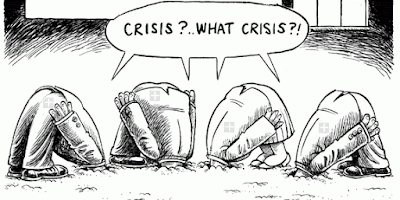Carl Jung ascribed the root of human evil to "The Refusal to meet the Shadow."
By "the shadow," Jung meant the part of our mind containing those things that we would rather not 'Own' up to, that we are continually trying to hide from ourselves and others and sweep under the rug of our consciousness.
Most of us, when pushed up against the 'Wall' by evidence of our own sins, failures, or imperfections, will acknowledge our shadow.
But by his use of the word "refusal," Jung was implying something more active.
Those who have Crossed over the Line that separates sin from evil are characterized most by their 'Absolute' refusal to tolerate a sense of their own sinfulness.
This is because their central defect is not that they have no consciousness but that they refuse to bear its pain.
In other words, it is not so much the sin itself but the refusal to acknowledge it that makes it evil.
In fact, the evil are often highly intelligent people who may be quite conscious in most respects but have a very specific unwillingness to acknowledge their Shadow.
Evil is not general ignorance; more specifically, it is militant ignorance of the shadow.
Those who are evil refuse to bear the pain of 'Guilt' or to allow the Shadow into consciousness and "Meet" it.
Instead, they will set about - often at great effort - Militantly trying to 'Destroy' the evidence of their own sin or anyone who speaks of it or represents it.
And in this act of destruction, their evil is committed.
Guilt - although often viewed as a "Downer" - is in many ways the blessing.
Having a genuine awareness of shortcomings is called a sense of personal sin.
It is not pleasant to become aware of the natural lazy, ignorant, self-centered beings that rather routinely betray its creator, its fellow creatures, and even its own best interests.
Yet this unpleasant sense of personal failure and inadequacy is, paradoxically, the greatest blessing a human being can possess.
Unpleasant though it may be, the gift of 'Appropriate' guilt is precisely what keeps our sins from getting out of hand.
It is our most effective safeguard against our own proclivity for evil.
Among the reasons for becoming more conscious is
to avoid becoming evil.
What can no longer be discounted under the flag of unwillingness to meet our shadow are the 'Sinister' stuff that remain lurking in the depths of the avarice unconscious mind.
We can no longer dismiss the fact that 'Avarice' has been localized in the unconscious realm by most thinkers, as if the unconscious were the seat of psychopathology, and symptoms were like subterranean demons.
The best measure in degree of consciousness can be found in consistency of the general approach to thinking.
For example, a person who is oriented toward thinking simplistically has a lesser degree of consciousness than a person who thinks with Integrity.
In this way, thinking and consciousness are inextricably locked together in a parallel relationship.
Consciousness is the foundation of all thinking, and thinking is the foundation of all consciousness.
Anytime there is a failure in thinking, there is a corresponding deficit in a persons level of consciousness.
Thus, all human behavior - the good, the bad, and the indifferent - is determined by the extent, or lack of thereof, of the quality of thinking and consciousness involved.
Since we all have neuroses of one sort or another - since no one can be completely conscious - how do we know when therapy needed?
Simple English; "When were stuck ", their is no need for therapy when we clearly growing well without it, but when were not growing, while stuck and spinning wheels, were obviously in a state of inefficiency.
And whenever there's a lack of efficiency there is a potentially unnecessary lack of competence.
So there is yet another reason to seek greater consciousness.
It is the foundation of mental and 'Spiritual' Growth and it is through this growth that we become ever more competent.
Reference share: M.Scott Peck, M.D - The Road Less Traveled















Value yourself as Jesus values you being comfortable in your own skin - in all affairs
ReplyDelete